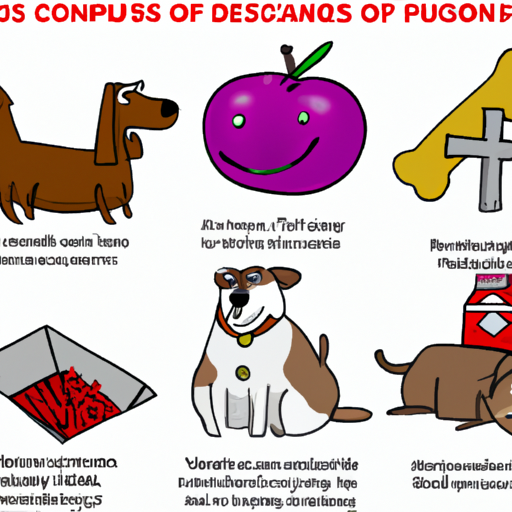Being a caregiver, you don’t just provide for the physical needs of those in your care, but you also protect them from harm. That includes dangers that may not be immediately apparent, like certain foods, plants, and other substances that can be poisonous to dogs. This article aims to guide you, as the person responsible for their well-being, to know what to avoid and what to do if your beloved pet comes into contact with these poisons.
1. Foods That Can Harm Your Dog
Certain foods that we humans enjoy daily can be harmful, even deadly, to our furry friends. Some of the most common ones include:
- Chocolate: Contains theobromine, which dogs cannot metabolize effectively.
- Grapes and Raisins: Can cause kidney failure in dogs.
- Onions and Garlic: They can cause damage to a dog’s red blood cells, leading to anemia.
| Food | Toxic Substance | Effects |
|---|---|---|
| Chocolate | Theobromine | Can cause heart problems, muscle tremors or seizures |
| Grapes & Raisins | Unknown | Can cause kidney failure |
| Onions & Garlic | Thiosulphate | Can cause anemia |
2. Harmful Plants and Flowers
Many plants and flowers, while beautiful to look at, can be dangerous to dogs if ingested. Some of the most common ones are:
- Azaleas: Can cause vomiting, diarrhea, and in severe cases, can depress the nervous system.
- Tulips: The bulb contains toxins that can cause drooling, loss of appetite, and heart problems.
3. Household Items That Pose a Threat
Some household items may seem harmless but can be dangerous if your dog gets ahold of them. These include:
- Medications: Human medications like ibuprofen can cause vomiting, diarrhea, and even kidney or liver failure in dogs.
- Cleaning products: Many cleaning products contain chemicals that can burn the mouth, throat, and stomach.
4. Outdoor Dangers for Dogs
When your dog is outside, they may come into contact with potentially harmful substances like:
- Antifreeze: Ethylene glycol, found in antifreeze, is extremely toxic to dogs, causing kidney failure.
- Pesticides: If ingested, pesticides can cause vomiting, diarrhea, seizures, and even death.
5. What to Do if Your Dog Ingests Poison
If you suspect that your dog has ingested a poisonous substance, do the following immediately:
- Remove your dog from the area.
- Check to see if your dog is breathing and acting normally.
- Do not try to induce vomiting unless directed to do so by a vet.
- Contact your vet or a pet poison control center immediately.
Frequently Asked Questions
Q: My dog ingested chocolate, what should I do?
A: Contact your vet immediately. They may instruct you to induce vomiting or bring your dog in for treatment.
Q: Are all plants and flowers toxic to dogs?
A: No, not all plants and flowers are toxic to dogs. However, it’s always best to research before bringing a new plant into your home.
Q: What common household items should I keep away from my dog?
A: Keep medications, cleaning products, and any food harmful to dogs out of their reach.
By being aware of what is poisonous for dogs, you can create a safer environment for your furry friend. Their health and safety are in your hands, and with this knowledge, you’re one step closer to providing the care they deserve.



